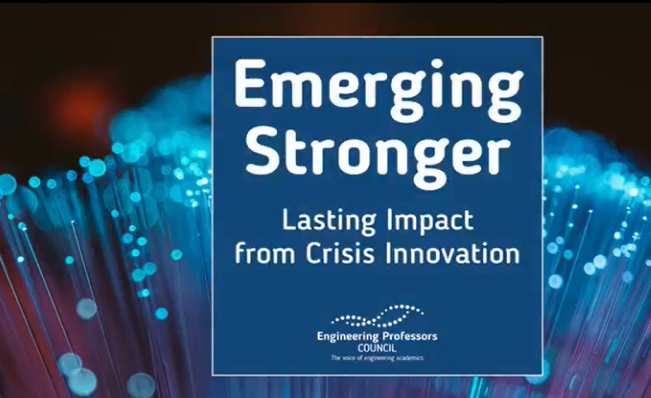What have we learned about learning under lockdown? How can we use the experience of trying to deliver high-quality engineering degree programmes to strengthen our teaching in future? This live webcast discussed the positive impacts of Covid-19 on university teaching and explored the solutions to the unique challenges faced by online learning with a focus on lessons learnt which could potentially be carried forward post-Covid.
Important links
You can download the ‘Emerging Stronger’ report by Prof Bev Gibbs and Dr Gary C Wood at here.
If you have any ideas or experiences with improving the online learning experience or have ideas on evaluation, you can share your 500-600 word case study until 31st March 2021 (The deadline for submissions has now passed. Unfortunately, you can no longer submit entries).
Catch up with the recorded webcast
Episode 1 including Keynote by Sir Michael Barber and first panel session (see details below).
Episode 2 including second panel session and summary (see details below).
Key points
Keynote (Rec 1 00:05:50): Sir Michael Barber, Chair of the OfS Board
Sir Michael congratulated the university sector for its resilience, vigour, innovative capacity and dedication in these challenging times. He outlined five thoughts around Emerging Stronger and potential innovations in pedagogy.
- Promoting social and economic value. While the OfS doesn’t pick and choose between subjects, high-cost subjects, including engineering, are highly prized by Government and the OfS for their contribution to our society and our economy through teaching future generations from an increasing breadth of backgrounds. (Watch the upcoming T grant consultation for some potentially good news for engineering.) What more can engineering do beyond what it already does to shape our economy and society in the future?
- Experimentation in course design. Engineering already demonstrates a diversity of models of teaching and learning, including degree apprenticeships. What is the right mix of applied and theoretical teaching and how should this change over time? What are the range of models that we want?
- Strengthening pedagogy through innovation and digital teaching. The EPC is in a strong position to build on what has already been developed and to move the sector forwards with a great diversity of innovative pedagogy models. It’s not too late to respond to the consultation on this. (Look out for the OfS report to be published in February or March). What can be done to prepare for the next academic year and the longer term?
- Contributing to the future. What is the role of engineering faculties within universities in spreading opportunities and economic growth more equitably.? In the past, great engineering breakthroughs have been brought through crisis; engineering can play a leading role in building a better future. What might that be?
- Innovations in engineering. Awesome technological developments will lead us to new opportunities. The future is bright for engineering.
Emerging Stronger Paper Overview (Rec 1 00:31:30): Prof Bev Gibbs, Chief Academic Officer at NMiTE, and Dr Gary C Wood, Head of Sheffield Engineering Leadership Academy
Emerging Stronger 2020 was about sharing early ideas and the immediate response. There was little opportunity for evaluation due to the short timeframe available.
The major themes investigated in Emerging Stronger 2020 were Assessment, Student collaboration and professional skills, Practical work, Employability, and Student Partnership.
Emerging Stronger 2021 will focus more on student experience and evaluating the ideas presented in Emerging Stronger 2020.
Large Cohort Team-Based Learning (TBL) (Rec 1 00:42:40): Alexander Lunt, Lecturer, University of Bath
Historically passive Q&A tutorials are ineffective and under-utilised. Team based learning improves engagement and interaction.
It is useful to have online assessment before in-person meetings for students to be able to practise. This allowed students to have questions to bring to the in-person meeting. Increasing engagement.
Internet of Things Student Placements (Rec 1 00:49:30): Ceri Batchelder, Royal Society Entrepreneur in residence and SELA Board Member, University of Sheffield and Mo-Anna Tucker, SELA Graduate, University of Sheffield, and Intern, Recycling Technologies
Offering online placements enabled more places to be offered. Online placements can offer more flexible working options. Internet of Things (IoT) environment sensors were able to be accessed from students’ homes using the internet, allowing the placement to be conducted remotely.
Mental Health and Wellbeing of Engineering Students (Rec 1 00:57:30): Jo-Anne Tait, Academic Strategic Lead, Robert Gordon University
There are high rates of mental health illness amongst engineering students. Online teaching exacerbated problems and any available support is less accessible. Mental Health of staff and students should be prioritised more.
Promoting lecture and examples sheet interactivity (Rec 2 00:01:05): David Fletcher, Professor of Railway Engineering, University of Sheffield
Adding a question asking function to online slides is useful as it allows students to ask questions about the content anonymously. This is useful for foreign students who may not be confident in their English ability along with people scared of asking questions in person. Answers to all questions submitted were given in the next lecture.
Online Project Based Learning: Engineering Design (Rec 2 00:07:15): Daniel Beneroso, Assistant Professor, University of Nottingham
Online refresher lectures along with reviewing progress against key milestones is useful. Each student getting a mentor helps ensure that they stay on track. A strong support structure is necessary.
Student Partnership in Learning Design (Rec 2 00:14:50): Ryan Grammenos, Senior Teaching Fellow, UCL
Attempted to use 3 different platforms to perform a project remotely as no one platform did everything needed. Students were overwhelmed and unhappy with this approach. Students felt lost and did not know where to start. It was a struggle to communicate expectations and the staff had forgotten what it was like to be a first year.
By Ewan Radford, an undergraduate in Integrated Masters in Electronic Engineering with Space Systems at the University of Surrey.




